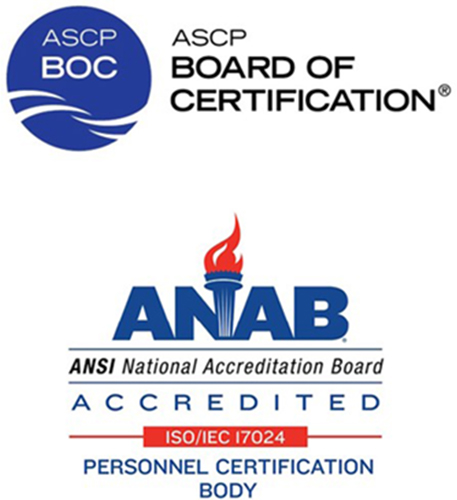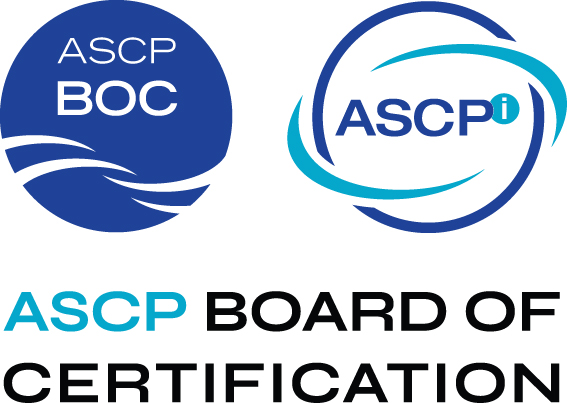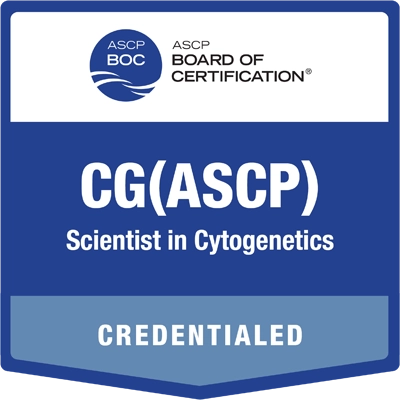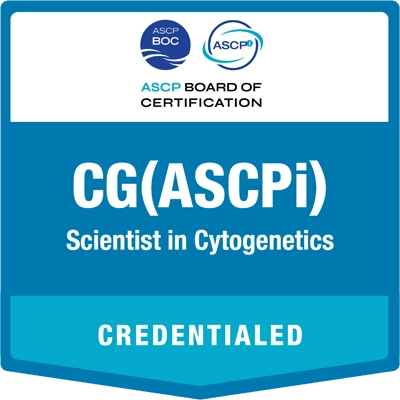Obtain certification and advance your career in cytogenetics with our specialized credential.
Attaining an American Society for Clinical Pathology Board of Certification (ASCP BOC) credential requires a laboratory professional or other expert to meet specific education, training, and/or experience standards and to successfully pass an examination demonstrating knowledge and applied skills. The ASCP BOC offers ASCP and ASCPi credentials based on distinct eligibility requirements. All candidates must carefully compare credentialing options. Additional information is available about the similarities and differences between ASCP and ASCPi credentials.
Each credential has specific eligibility requirements, which are different for ASCP and ASCPi. It’s your responsibility to confirm that your education, training, and/or experience meet the criteria. Submit the correct documentation with your application. Once submitted, the category and route of application cannot be changed.
Check Your EligibilityAn applicant must be able to verify that they meet all eligibility requirements, including education, training, and/or experience. For complete information, see the Documentation section of the website.
Education does not need to be from the United States. Details are available by reviewing the webpage titled Acceptable Education, also available in the routes below.
To be eligible for this examination category, an applicant must satisfy the minimum requirements (for degrees, the stated degree or higher) of at least one of the following routes:
An applicant must be able to verify that they meet all eligibility requirements, including education, training, and/or experience. For complete information, see the Documentation section of the website.
Education needs to be equivalent to education from the United States. Details are available by reviewing the webpage titled Acceptable Education, also available in the routes below.
To be eligible for this examination category, an applicant must satisfy the minimum requirements (for degrees, the stated degree or higher) of at least one of the following routes:


Baccalaureate degree from an accredited (regionally or nationally) college/university,
AND successful completion of a NAACLS-accredited Cytogenetic Technologist program within the last 5 years.
The education received from a NAACLS-accredited Cytogenetic Technologist program is acceptable for a period of 5 years from the date of completion of that program.
Baccalaureate degree from an accredited (regionally or nationally) college/university with a major in biological science or chemistry, OR a baccalaureate degree from an accredited (regionally or nationally) college/university with a combination of 30 semester hours (45 quarter hours) in biology and chemistry, which may be obtained within, or in addition to, the baccalaureate degree,
AND 1 year of full-time acceptable clinical* experience in an acceptable cytogenetics^ laboratory within the last 3 years that must be documented on this Experience Documentation Form.
*Acceptable Clinical Laboratory:
CMS CLIA certificate of registration, compliance, accreditation;
OR DoD CLIP certificate of registration, compliance, accreditation;
OR JCI accreditation;
OR Accreditation under ISO 15189.
^A cytogenetics laboratory is defined as one capable of providing individuals with knowledge and practical experience in clinical cytogenetics such as primary cell culture and harvest, slide preparation and staining, chromosome analysis, microscopic and image analysis, and molecular techniques (e.g., fluorescence in situ hybridization (FISH) and microarray).
Master’s degree from an accredited (regionally or nationally) college/university in genetics or molecular biology,
AND 6 months of full-time acceptable clinical* experience in an acceptable cytogenetics^ laboratory within the last 3 years that must be documented on this Experience Documentation Form.
*Acceptable Clinical Laboratory:
CMS CLIA certificate of registration, compliance, accreditation;
OR DoD CLIP certificate of registration, compliance, accreditation;
OR JCI accreditation;
OR Accreditation under ISO 15189.
^A cytogenetics laboratory is defined as one capable of providing individuals with knowledge and practical experience in clinical cytogenetics such as primary cell culture and harvest, slide preparation and staining, chromosome analysis, microscopic and image analysis, and molecular techniques (e.g., fluorescence in situ hybridization (FISH) and microarray).
Baccalaureate degree from an accredited/approved* educational institution,
AND successful completion of an accredited/approved* cytogenetics clinical training program* which includes an internship that must be documented on this Training Documentation Form.
*Accredited/approved by a governing regulatory association or Ministry. Countries without a prevalent system of accreditation/approval must have programs/educational institutions approved by an International Advisory Board appointed by the ASCP Board of Certification, or eligibility will be determined by an acceptable transcript evaluation. The foreign degree must be equivalent to a U.S. degree.
Baccalaureate degree from an accredited/approved* educational institution in biological science or chemistry, OR a baccalaureate degree from an accredited/approved* educational institution with a combination of 30 semester hours in biology and chemistry, which may be obtained within, or in addition to, the baccalaureate degree,
AND 1 year of acceptable clinical# experience in an acceptable cytogenetics^ laboratory that must be documented on this Experience Documentation Form.
*Accredited/approved by a governing regulatory association or Ministry. Countries without a prevalent system of accreditation/approval must have programs/educational institutions approved by an International Advisory Board appointed by the ASCP Board of Certification, or eligibility will be determined by an acceptable transcript evaluation. The foreign degree must be equivalent to a U.S. degree.
#Clinical laboratory accredited by JCI, CAP, under ISO 15189 or authorized by a governing regulatory association or Ministry. Countries without a prevalent system of accreditation must have laboratories approved by an International Advisory Board appointed by the ASCP Board of Certification.
^A cytogenetics laboratory is defined as one capable of providing individuals with knowledge and practical experience in clinical cytogenetics such as primary cell culture and harvest, slide preparation and staining, chromosome analysis, microscopic and image analysis, and molecular techniques (e.g., fluorescence in situ hybridization (FISH) and microarray).
Master’s degree from an accredited/approved* educational institution in genetics or molecular biology,
AND 6 months of acceptable clinical# experience in an acceptable cytogenetics^ laboratory that must be documented on this Experience Documentation Form.
*Accredited/approved by a governing regulatory association or Ministry. Countries without a prevalent system of accreditation/approval must have programs/educational institutions approved by an International Advisory Board appointed by the ASCP Board of Certification, or eligibility will be determined by an acceptable transcript evaluation. The foreign degree must be equivalent to a U.S. degree.
#Clinical laboratory accredited by JCI, CAP, under ISO 15189 or authorized by a governing regulatory association or Ministry. Countries without a prevalent system of accreditation must have laboratories approved by an International Advisory Board appointed by the ASCP Board of Certification.
^A cytogenetics laboratory is defined as one capable of providing individuals with knowledge and practical experience in clinical cytogenetics such as primary cell culture and harvest, slide preparation and staining, chromosome analysis, microscopic and image analysis, and molecular techniques (e.g., fluorescence in situ hybridization (FISH) and microarray).
Reduced pricing is available for those educated and residing in low-to-middle income countries.
You must upload the appropriate documentation form when you apply online, verifying that you meet the training and/or experience requirements for your category and route of application. You will also need to submit an acceptable transcript or transcript evaluation verifying that you meet the academic requirements. Gather your documents before submitting your application and application fee.
Once you have confirmed that you meet the requirements and have gathered your documents, submit your online application.
 |  |
In early 2026, the ASCP BOC will launch digital badging through Credly, a trusted provider that increases the visibility of ASCP BOC credential holders by securely showcasing and sharing professional credentials. Learn more about digital badges.
.jpg?sfvrsn=501cfd70_1)